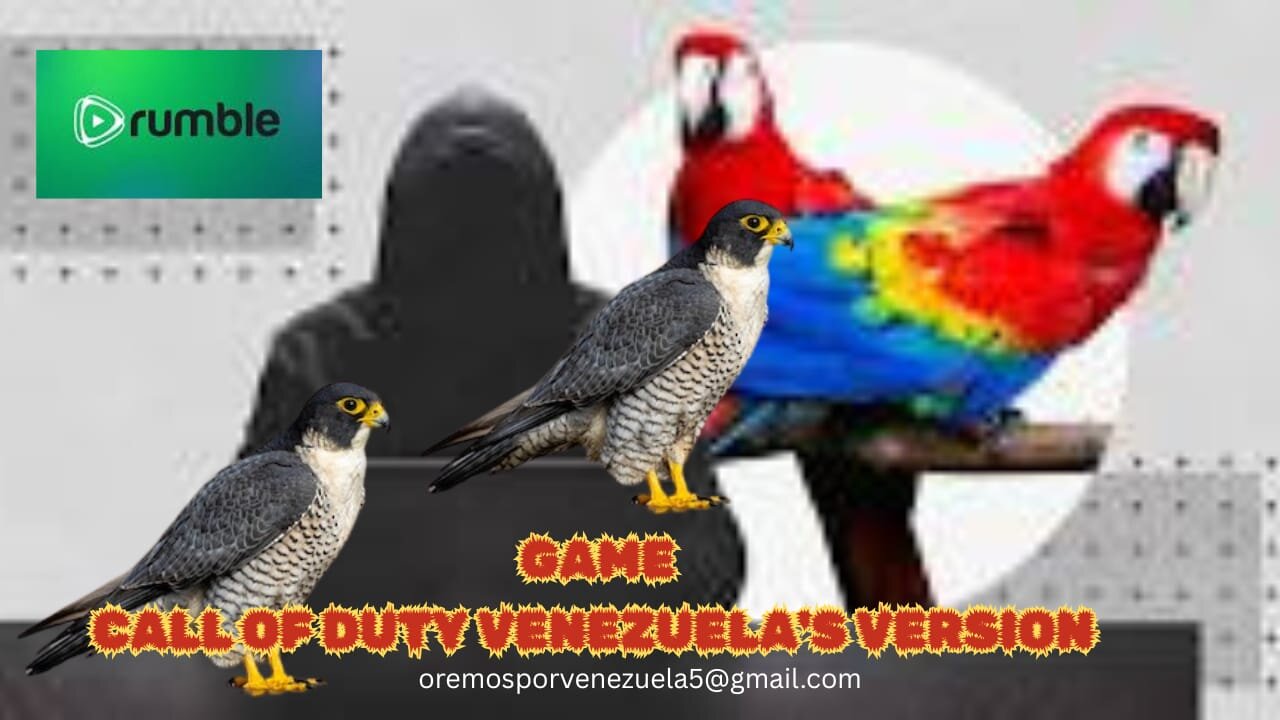Premium Only Content

The Venezuela’s Call Of Duty Parrot Op
The term "Operation Guacamaya" refers to two distinct events: a hacktivist campaign by a Latin American group and a 2025 rescue operation in Venezuela. Below, I’ll explain both based on available information, focusing on their distinct contexts and objectives.
### 1. **Guacamaya Hacktivist Campaign (2022–2023)**
**Overview**:
Operation Guacamaya refers to a series of cyberattacks conducted by an anonymous hacktivist collective named Guacamaya (Spanish for "macaw") primarily in 2022. The group targeted government and military institutions, as well as corporations, across Latin America, focusing on exposing corruption, human rights abuses, and environmental exploitation. Their operations were driven by an anti-imperialist and environmentalist ideology, aiming to reveal the actions of governments and transnational corporations in Latin America, particularly those involved in extractivism (resource exploitation) and repression of indigenous communities.[](https://en.wikipedia.org/wiki/Guacamaya_%28hacktivist_group%29)[](https://en.m.wikipedia.org/wiki/Guacamaya_%28hacktivist_group%29)[](https://en.wikipedia.org/wiki/Guacamaya_%28hacktivist%29)
**Key Details**:
- **Targets**: Guacamaya hacked military and government systems in Chile, Colombia, El Salvador, Guatemala, Mexico, and Peru, as well as major corporations like the Compañía Guatemalteca de Níquel (CGN), a subsidiary of Solway Investment Group. They also targeted mining and energy companies.[](https://en.wikipedia.org/wiki/Guacamaya_%28hacktivist_group%29)[](https://en.m.wikipedia.org/wiki/Guacamaya_%28hacktivist_group%29)
- **Operation Fuerzas Represivas**: In mid-2022, Guacamaya launched this campaign targeting the armed forces of multiple Latin American countries. Notable leaks included:
- **Chile**: Over 400,000 emails from the Chilean Joint Chiefs of Staff (EMCO) from 2012 to May 2022, exposing national security data and leading to the resignation of General Guillermo Paiva Hernández.[](https://en.wikipedia.org/wiki/Guacamaya_%28hacktivist_group%29)[](https://en.m.wikipedia.org/wiki/Guacamaya_%28hacktivist_group%29)
- **Mexico**: Approximately 6 terabytes of data from the Mexican Ministry of National Defense (Sedena), revealing the military’s use of Pegasus spyware to monitor journalists and activists, arms sales to drug cartels, and surveillance of groups like the Zapatistas and Ayotzinapa students.[](https://nsarchive.gwu.edu/briefing-book/mexico-ayotzinapa/2023-03-10/guacamaya-leaks-and-ayotzinapa-case)[](https://www.democracynow.org/2022/10/12/headlines/guacamaya_leak_reveals_mexican_govt_sold_arms_to_drug_cartels_spied_on_reporters)[](https://www.securitynewspaper.com/2022/09/30/hacktivist-group-guacamaya-leaks-6-tb-of-confidential-data-from-the-mexican-government-and-military/)
- **Peru**: Leaks from the Joint Command of the Armed Forces (CCFFAA) showed military surveillance of reporters and civil organizations opposing mining projects, with threats of treason charges against journalists.[](https://en.wikipedia.org/wiki/Guacamaya_%28hacktivist_group%29)[](https://en.m.wikipedia.org/wiki/Guacamaya_%28hacktivist_group%29)
- **Colombia**: Over 7 million emails from the Colombian prosecutor’s office (2001–2022) exposed communications with foreign embassies and authorities.[](https://en.wikipedia.org/wiki/Guacamaya_%28hacktivist_group%29)
- **Guatemala**: Documents revealed payments by CGN to Guatemalan police to suppress activists and journalists opposing the Fénix mining project.[](https://en.wikipedia.org/wiki/Guacamaya_%28hacktivist_group%29)[](https://www.connectas.org/latin-america-hacktivism-guacamaya-leaks/)
- **Methods**: Guacamaya exploited vulnerabilities like ProxyShell in Microsoft email servers, requiring only intermediate technical expertise. They used doxxing (public disclosure of sensitive information) and collaborated with transparency groups like Distributed Denial of Secrets and Enlace Hacktivista to distribute leaks.[](https://www.connectas.org/latin-america-hacktivism-guacamaya-leaks/)[](https://en.m.wikipedia.org/wiki/Guacamaya_%28hacktivist_group%29)
- **Ideology and Aesthetics**: The group framed their actions as resistance against "genocide, terricide, and corruption" in Abya Yala (an indigenous term for the American continent). They paired leaks with manifestos, videos, and music evoking indigenous and revolutionary themes, emphasizing anti-colonialism and environmental protection.[](https://therecord.media/interview-with-guacamaya-hacktivist-group-latin-america)[](https://cyberscoop.com/guacamaya-hacktivist-group-latin-america-interview/)
- **Impact**: The leaks exposed systemic issues like military surveillance, corruption, and environmental damage, sparking media investigations (e.g., NarcoFiles) and public discourse. However, some criticized the leaks for focusing on sensational details (e.g., Mexican President López Obrador’s health) rather than broader governance issues. Guacamaya’s actions were compared to WikiLeaks, though their regional focus and indigenous rhetoric set them apart.[](https://therecord.media/mexican-president-confirms-guacamaya-hack-targeting-regional-militaries)[](https://www.tandfonline.com/doi/full/10.1080/23738871.2024.2419509)
**Speculation and Criticism**:
- Some speculated Guacamaya might be a state-sponsored operation (e.g., linked to Russia or China) to destabilize Western-aligned governments, but no conclusive evidence supports this.[](https://latinoamerica21.com/en/guacamaya-hacktivists-from-the-global-south/)
- Critics argued the leaks endangered individuals by exposing sensitive data and questioned whether Guacamaya selectively targeted left-wing governments. The group denied state affiliations, emphasizing their grassroots, community-driven nature.[](https://cyberscoop.com/guacamaya-hacktivist-group-latin-america-interview/)
### 2. **Operation Guacamaya: Venezuela Rescue Operation (May 2025)**
**Overview**:
Operation Guacamaya also refers to a clandestine rescue operation executed in early May 2025 to extract five Venezuelan opposition leaders from the Argentine Embassy in Caracas, where they had been under siege by the Maduro regime. The operation was a significant blow to the Venezuelan government, exposing vulnerabilities in its security apparatus.[](https://es.wikipedia.org/wiki/Operaci%25C3%25B3n_Guacamaya)[](https://greydynamics.com/operation-guacamaya-u-s-covert-extraction-in-caracas/)[](https://www.miamiherald.com/news/nation-world/world/americas/venezuela/article307783805.html)
**Key Details**:
- **Context**: In March 2024, six members of the opposition party Vente Venezuela—Pedro Urruchurtu, Magallí Meda, Claudia Macero, Humberto Villalobos, Omar González, and Fernando Martínez Mottola—sought asylum in the Argentine Embassy to evade arrest warrants for alleged conspiracy and treason. After diplomatic tensions, Argentina withdrew from the embassy, and Brazil took over its protection on August 1, 2024.[](https://es.wikipedia.org/wiki/Operaci%25C3%25B3n_Guacamaya)[](https://es.wikipedia.org/wiki/Operacion_guacamaya)
- **Execution**: On May 6, 2025, after 412 days of asylum, five of the opposition leaders were extracted in a highly coordinated operation involving the United States, Argentina, and Brazil. They were safely transported to U.S. territory. The operation was described as “impeccably planned” and executed “with the precision of a lightning bolt,” evading heavy surveillance around the embassy, considered Venezuela’s second-most-secure site after Miraflores Palace.[](https://es.wikipedia.org/wiki/Operacion_guacamaya)[](https://www.elmundo.es/internacional/2025/05/17/68277325fdddff7d638b4571.html)
- **Key Figures**: Venezuelan opposition leader María Corina Machado praised the operation, calling it a “monumental blow” to Maduro’s repressive structure. U.S. Secretary of State Marco Rubio confirmed the rescue on social media, thanking involved personnel and partners without specifying their roles.[](https://es.wikipedia.org/wiki/Operaci%25C3%25B3n_Guacamaya)[](https://www.miamiherald.com/news/nation-world/world/americas/venezuela/article307783805.html)[](https://es.wikipedia.org/wiki/Operacion_guacamaya)
- **Impact and Reactions**:
- The operation exposed internal fractures in the Maduro regime and its intelligence services, with some sources suggesting collusion within the Venezuelan Bolivarian Intelligence Service (SEBIN) or military.
- Machado warned of heightened risks for remaining opposition figures due to potential regime retaliation.[](https://es.wikipedia.org/wiki/Operacion_guacamaya)
- The Maduro government, via Minister Diosdado Cabello, claimed the opposition members left voluntarily with safe-conduct passes, a narrative dismissed by opposition leaders as an attempt to downplay the operation’s success.[](https://www.elmundo.es/internacional/2025/05/17/68277325fdddff7d638b4571.html)[](https://misionverdad.com/venezuela/desmontando-la-operacion-guacamaya)
- **Speculation**: Some reports suggested possible CIA or foreign intelligence involvement, though the White House denied active U.S. participation inside Venezuela. Clandestine sources indicated up to seven individuals, including family members, might have been extracted.[](https://greydynamics.com/operation-guacamaya-u-s-covert-extraction-in-caracas/)[](https://www.miamiherald.com/news/nation-world/world/americas/venezuela/article307783805.html)
**Public Sentiment**:
Posts on X reflect strong support for the operation among opposition supporters, with María Corina Machado hailed as a leader for orchestrating a “perfect” operation. Some users speculated about a larger planned “coup” against Maduro, though these claims lack verification.
### Clarification and Conclusion
The term “Operation Guacamaya” primarily refers to the 2022 hacktivist campaign in most contexts, given its broader regional impact and media coverage. The 2025 Venezuelan rescue operation, while significant, is a more recent and geopolitically specific event. If you’re referring to one specifically, please clarify for a more focused response. For further details on the hacktivist campaign, see sources like Wikipedia or Latinoamérica 21; for the rescue operation, see Miami Herald or El Mundo.[](https://en.wikipedia.org/wiki/Guacamaya_%28hacktivist_group%29)[](https://www.miamiherald.com/news/nation-world/world/americas/venezuela/article307783805.html)[](https://www.elmundo.es/internacional/2025/05/17/68277325fdddff7d638b4571.html)
If you have additional context or a specific aspect you’d like explored (e.g., technical details of the hacks or geopolitical implications of the rescue), let me know!
-
 1:09:25
1:09:25
Donald Trump Jr.
5 hours agoCorrupt UN Carbon Tax Exposed, Interview with John Konrad | TRIGGERED Ep.285
137K67 -
 42:58
42:58
TheCrucible
3 hours agoThe Extravaganza! EP: 59 with Guest Co-Host: Rob Noerr (10/23/25)
66K4 -
 8:29
8:29
Colion Noir
10 hours agoThree Masked Idiots Show Up at Her Door — Here’s What Happened Next
10.8K11 -
 1:40:59
1:40:59
Kim Iversen
5 hours agoTrump Threatens To End ALL Support For Israel
59.7K89 -
 15:38
15:38
Cash Jordan
5 hours agoPortland Zombies EMPTY 52 Stores… Mayor FREAKS as “Sanctuary” SELF DESTRUCTS
33.3K41 -
 LIVE
LIVE
LFA TV
22 hours agoLIVE & BREAKING NEWS! | THURSDAY 10/23/25
509 watching -
 LIVE
LIVE
Side Scrollers Podcast
8 hours ago🔴FIRST EVER RUMBLE SUB-A-THON🔴DAY 4🔴BLABS VS STREET FIGHTER!
976 watching -
 LIVE
LIVE
LIVE WITH CHRIS'WORLD
4 hours agoLIVE WITH CHRIS’WORLS - J6 Pipe Bomber | Candace is NUTS | NBA Gambling Scandal | AND MUCH MORE!
63 watching -
 1:56:46
1:56:46
Redacted News
5 hours agoHIGH ALERT! Trump pushes "land war" in Venezuela, and Russia goes nuclear | Redacted News Live
137K87 -
 16:47
16:47
Robbi On The Record
3 hours ago $1.92 earnedThe Day Seeing Stopped Meaning Believing | Sora, AI and the Uncanny Valley
21.7K18